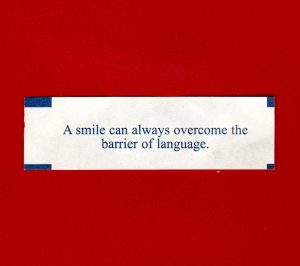Fortune Cookie Friday: Smile and the World Smiles With You

Have you ever met someone from a foreign country and spoke to them in a slow—sometimes loud—deliberate way? You make every effort to enunciate each syllable in hopes that they will understand you. Soon your shouting and methodically mouthing your words like you’re trying to communicate through a thick glass box. Communication is key. When dealing with someone that doesn’t speak your language well, it’s best to use familiar gestures and speak in the present tense as much as possible. And don’t forget to smile.
Smiling can help overcome the barrier of language. This is especially true in countries that have high immigration rates over a long period of their history. In a study published in the Proceedings of the National Academy of Sciences, led by University of Wisconsin–Madison psychology Professor Paula Niedenthal, researchers found that people who live in countries with a great influx of migration are more likely to smile to maintain “social bonds.”
There are very few words understood in many languages that span the globe. It’s highly regarded that the most understood phrase in the world is “OK” followed by Coca-Cola®. When two people can’t speak the same language, a smile transcends the verbal pool of phraseology. There may be something to the slogan, “Have a Coke and a smile.”
Human beings begin smiling way before we speak. We actually start smiling before we are born, but those are reflexes. Our first real smiles make their appearance between the ages of 6 and 12 weeks old. These are due to the sound of familiar voices of our parents and later by visual stimuli. Smiling is a way for us to connect with others and it works.

In 1929, Nat King Cole sang, “When you’re smiling, the whole world smiles with you.” Well, one Italian study found that to be true. Apparently, smiles are contagious, even when we try to remember them. Well, I guess if you have to catch something, a smile isn’t so bad.
At the International School for Advanced Studies (SISSA) of Trieste, a research team studied memories and their corresponding emotions with relation to facial expressions. According to researcher Jenny Baumeister, “Theories of embodied emotion state that in order to process an emotion we first reproduce the facial movements of the expression induced by that emotion. In practice, if we watch someone smiling, we tend to smile as well in order to appreciate what that person is feeling. We applied this finding to memory and assessed whether it is also true when we’re trying to recall an emotion.”
After studying participants performing memory tasks with and without clay masks—facials anyone?—they found that in order for us to recall an emotion (positive or negative) we “re-enact” a facial expression corresponding to that emotion. We frown to recall sadness and smile to recall happiness.
Those contagious smiles can also make us feel good. I’ve written about the benefits of smiling before. Flashing a toothy grin activates the release of chemicals like neuropeptides, that aid in fighting off stress. It also releases neurotransmitters that relax your body. Neurotransmitters like dopamine, endorphins, and serotonin stimulate the feel-good centers of your brain, relieve pain, and reduce depression. We get all this from smiling; no prescription necessary.

A smile is more than a form of communication that spans the language barrier. Victor Borge said, “The shortest distance between two people is a smile.” It helps us relive happy memories, makes us feel good, and brings us closer together.




